Ari Berman on the 50th Anniversary of the Voting Rights Act
By Scott Porch
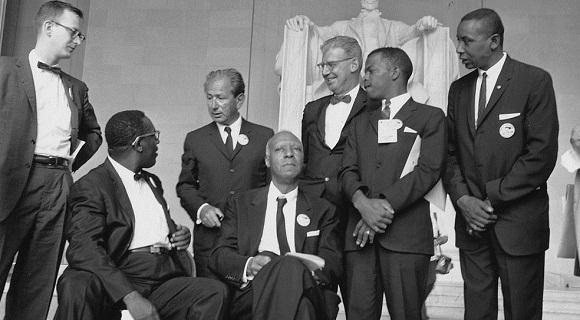
Civil Rights March on Washington, D.C., 1963 - Leaders of the march
Editor's Note: In our first Friday Five, we discuss five books with author Ari Berman that influenced his thinking on Give Us the Ballot, his new history of the Voting Rights Act. Have other topics in mind for our Friday Five? Let us know at [email protected].
On August 6, 1965, President Lyndon Johnson signed the Voting Rights Act of 1965. It was the fourth major piece of legislation in a decade to address voting rights in the United States, and there have been numerous changes to the law in the last fifty years, but the Voting Rights Act was a watershed law because it came with a strong enforcement mechanism known as preclearance.
Ari Berman’s new book Give Us the Ballot: The Modern Struggle for Voting Rights in America is a history of how the law was passed, how it developed, and how the Supreme Court ended preclearance -- which required states with poor records of minority voting to "preclear" changes to state voting laws with the Justice Department -- in a 2013 case called Holder v. Shelby County.
Biographile talked to Berman this week for a new feature called The Friday Five, which will look at books that have influenced an author’s thinking on a particular subject. This week we're discussing Robert Caro's Master of the Senate, Nick Kotz's Judgment Days, David Garrow's Protest at Selma, John Lewis’s Walking with the Wind, and Rick Perlstein's Nixonland.
Biographile: Did you start with an interest in how voting issues have changed since the 1960s, or did you start with issues you see now and work your way backwards?
Ari Berman: Most people who write histories start at the beginning of that history and figure out how it relates to the present day. I did the opposite. I looked at what’s happening with voting rights in the present day and worked backwards to explain how it was that the Voting Rights Act was being challenged nearly fifty years after its passage.
What really got me interested in the history was the 2013 challenge to the Voting Rights Act. I had been covering voting rights at that point for a few years, and I became very interested in the history of the Voting Rights Act. What I realized when I started doing research was that there was a lot of stuff about what led to the passage of the Act in 1965, but much less had been written about what the Act did after 1965.
BIOG: Herding Donkeys was about grassroots campaigning and most about the 2008 election. Were you already interested in voting-rights issues by that time?
AB: I became interested when new laws started being passed after the 2010 election to make it harder to vote. I started noticing that new laws were popping up in Florida, Ohio, Wisconsin, Pennsylvania that weren’t getting a lot of attention, so I pitched a story to Rolling Stone about it, and that became my first piece on voting rights. I became one of the few journalists writing about the issue.
BIOG: Did you see things in North Carolina in 2008 that indicated to you that voting restrictions were about to become an issue there?
AB: No. The North Carolina that I wrote about in Herding Donkeys was a state that had expanded voting rights. Obama was about to narrowly win the state in 2008 because of things like early voting and same-day registration. When North Carolina started to cut those things in 2013, I understood why. The Obama campaign had used those reforms so successfully, and it freaked a lot of Republicans out.
BIOG: Is the Republican explanation for shortening early voting that everyone still has enough time to vote?
AB: I really haven't heard a good explanation for cutting early voting. They will say they want uniformity in the election laws, that they don't want rural counties to have to have the same hours as urban counties. The problem is that you're making it harder to vote in the areas that have the most people, so I find that logic kind of strange. Republicans were for early voting before 2008. Jeb Bush was for it in Florida. They only turned against it after Barack Obama was elected, so I see it as a very partisan thing that they’re doing.
BIOG: And that’s because there’s demonstrable evidence that Democratic voters are more likely to vote early than Republican voters?
AB: There’s certainly evidence from 2008 that people who voted early were more likely to vote for Barack Obama.
BIOG: Why is that, you think?
AB: I think it’s because the Democratic coalition is less likely to vote in general than the Republican coalition. Republican voters tend to be older, wealthier, and vote in every election. The Democratic coalition tends to be younger and more diverse and doesn’t always vote. Democrats need to bring new people into the democratic process, whereas Republicans can generally rely on a usual segment of the electorate.
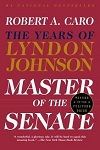 BIOG: The big centerpiece at the end of Robert Caro's Master of the Senate is the Civil Rights Act of 1957, which was mostly a voting rights act that didn’t work very well in practice. Do you have some sense of why it didn’t work very well?
BIOG: The big centerpiece at the end of Robert Caro's Master of the Senate is the Civil Rights Act of 1957, which was mostly a voting rights act that didn’t work very well in practice. Do you have some sense of why it didn’t work very well?
AB: It worked in the sense that it got the Civil Rights Division launched at the Justice Department, but it didn’t work for, I think, two reasons. No. 1, the Civil Rights Division really wasn’t a priority for the Justice Department at the time. No. 2, the 1957 Act -- just like the 1960 Act and 1964 Act -- relied on a very slow process of litigation to try and strike down things like literacy tests and poll taxes.
The problem with that is that even if the federal government filed suit to stop a literacy test in a place like Selma, the lawsuit was either going to go before segregationist judges in those states who weren’t favorable to civil rights or would just take such a long time while the case was going through the courts that states like Alabama would just adopt different tests to disenfranchise black voters.
BIOG: Caro says in Master of the Senate that the important thing about the 1957 Act was that Johnson was able to reorient a Senate that wasn’t previously able to pass civil-rights and voting-rights legislation into a posture where something -- even something ineffective or without enforcement teeth -- could pass, and that you don’t get the 1960 Act and the 1964 Act without the 1957 Act having done it first.
AB: One thing that’s so interesting about Johnson is that he’s remembered for his sweeping achievements -- and the Voting Rights Act of 1965 was definitely an achievement -- but in the Senate he was very much an incrementalist. Particularly on civil rights, which put him in a tight spot as someone from Texas. His position at the time was that you had to do something, that you weren’t going to get sweeping legislation out of Senate and a Congress that was still largely controlled by southern Democrats.
I don’t think that Johnson necessarily thought he would have to pass three civil rights acts before he passed the VRA. He had hoped that the earlier civil rights acts would solve the problem. But it did get the ball rolling.
BIOG: Do you get the sense that Johnson evolved on civil rights or that he "evolved" in quotation marks the way Obama did on marriage equality?
AB: I think he didn’t have a change of heart as much as a change of constituency. When he was a representative and then a senator from Texas, he had to represent Texas’s interests. When he was president of the United States, he was president of all people and could be much more expansive. If you look at LBJ’s background, he taught Mexican-American kids. He cared a lot about the problems of poverty, the problems that faced racial minorities. He also did a lot of bad things on civil rights. It’s hard to know definitively, but he was enough of a supporter of civil rights that when the opportunity was there, he seized it.
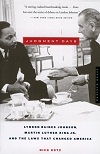 BIOG: I had always remembered Nick Kotz’s Judgment Days as a pulse-pounder about the Kennedy assassination, but it’s certainly about LBJ and MLK too. Why did you pick that book to talk about?
BIOG: I had always remembered Nick Kotz’s Judgment Days as a pulse-pounder about the Kennedy assassination, but it’s certainly about LBJ and MLK too. Why did you pick that book to talk about?
AB: It’s the best narrative on the relationship of King and LBJ as it pertains to civil rights and the Voting Rights Act more broadly. Kotz does an excellent job pulling all the material together. You can really understand what King was telling LBJ, what LBJ was telling King, what the pressures were on both of them.
This was a complicated relationship. King was under pressure from SNCC that he was being too accommodationist. LBJ was under pressure from all sides -- from the left for not moving fast enough, from the right for selling out his segregationist friends -- so it was a complicated relationship. Even though my book largely begins in 1965 with the passage of the VRA, I needed to know enough about the backstory between King and LBJ, and Kotz’s book really helped me understand that.
BIOG: Why was the Civil Rights Act of 1964, which did include a voting-rights title, not strong enough?
AB: The strong voting-rights part of the bill was stripped from it before it passed, so voting rights was sacrificed for all the other sections of the bill. There was an awareness even at the time the Civil Rights Act passed that it wasn’t going to solve the problem of voting discrimination. That’s why you see so soon after the Civil Rights Act passed in 1964 that people were still demonstrating for voting rights.
BIOG: The Kotz book had a real immediacy. These books are all largely based on archival material and oriented and laws passing, but he was able to get an immediacy and a pulse from some of these things that don’t naturally lend themselves to being a page-turner.
AB: One thing I took from the book was how to make history accessible and how to make it narratively interesting. You’re taking things that you didn’t witness as an author and relying on someone else’s description of something, and you have to translate it in your own way to a general audience. Making history narratively interesting is something that the Kotz book helped me with.
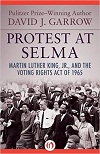 BIOG: Was David Garrow’s Protest at Selma your foundation on the Selma marches in 1965?
BIOG: Was David Garrow’s Protest at Selma your foundation on the Selma marches in 1965?
AB: That’s the best book I’ve read on Selma. It’s an easy read but it’s not too character-driven. He talks about all the different element of what happens in Selma from the segregationist perspective, from the media perspective, from the congressional perspective, so you see all of the elements that were at play and how complicated Selma was. That book really helped me to get up to speed on what happened in 1965.
BIOG: How much did the depiction of Lyndon Johnson in the "Selma" movie seem off to you?
AB: I really liked the movie, but I found the depiction of LBJ to be unfortunate. He wasn’t the villain in this story. He did tell King that the Voting Right Act would not be possible in early 1965. But once Selma happened, Johnson moved swiftly to push the Voting Rights Act. Not only that, his administration had been working on the Voting Rights Act for some time.
It wasn’t like Selma happened and then they pulled the Voting Rights out of thin air. This was something the Justice Department had been working on; it was just a question of timing. Making Johnson the villain in the story of the Voting Rights Act is very inaccurate.
BIOG: Julian Zelizer emphasized that in The Fierce Urgency of Now. The Voting Rights Act was deep into negotiations when Selma happened. That’s not to diminish the significance of anything that happened in Selma, but it grated on me that the movie treated Johnson as an antagonist.
AB: There were enough villains in Alabama -- Sheriff Jim Clark, George Wallace, Bull Connor -- that there was no reason to demonize LBJ. King and LBJ were much more partners than they were antagonists.
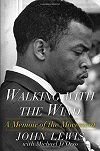 BIOG: John Lewis’s Walking with the Wind is cited in basically every book about voting rights, and I think it’s the only time he has written about the Voting Rights Act from his own perspective, right?
BIOG: John Lewis’s Walking with the Wind is cited in basically every book about voting rights, and I think it’s the only time he has written about the Voting Rights Act from his own perspective, right?
AB: He also has the new graphic novels [March: Book One and March: Book Two], but Walking With the Wind is the most comprehensive look at his life.
BIOG: It was an important resource for you?
AB: It was one of the first things I read, and I read it multiple times. It’s beautifully written. Political memoirs tend to be trite, and Lewis’s memoir is really well-written, very informative, very honest. I learned a lot about his role in Selma, but I learned a lot about his life after 1965, which tends to be emphasized less in the literature of the civil rights movement. I did two longer interviews with him, and the book helped me prepare for getting deep in the weeds when I talked to him. It’s one of the best memoirs I’ve ever read.
I did two long interviews with him, and he talked a lot about what he did after 1965. He ran a group called the Voter Education Project that was very influential in the 1970s. He almost never gets asked about that. I talked to him about how he got involved in politics, running against his best friend, Julian Bond, in his first campaign for Congress, the work he has done on voting rights in Congress.
BIOG: I don’t believe anyone has written a biography of John Lewis.
AB: David Halberstam wrote a lot about Lewis's early years in The Children, his book about the early years of the civil rights movement, but there isn’t a straight-up biography about him. Lewis has really told his own story -- through the memoir and now through the graphic novels that have reached a younger audience.
He has wanted to tell his own story; that said, he was very supportive and encouraging of me telling his story with regard to voting rights. I had written a profile of him for The Nation and had interviewed him for other articles, so he and his staff knew that I would present him fairly and accurately.
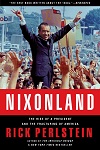 BIOG: The last book is Rick Perlstein’s Nixonland, which starts with the Watts Riots in 1965 and goes through the election in 1968. Why was that book significant to you as a piece of civil rights history.
BIOG: The last book is Rick Perlstein’s Nixonland, which starts with the Watts Riots in 1965 and goes through the election in 1968. Why was that book significant to you as a piece of civil rights history.
AB: One of the main things I wanted to do in Give Us the Ballot was to tell the story of the counter-revolution against voting rights and the broader backlash to the civil rights laws of the 1960s. I felt like that was such an important story today that had not been very well told. Perlstein’s previous book Before the Storm about Barry Goldwater and Nixonland are great on the conservative counter-revolution on civil rights.
Richard Nixon is such an important character. His Southern Strategy totally reoriented the Republican Party to be much more outspoken in its criticism of civil rights. Nixon was a total opportunist. I don’t believe he had any principles at all. He sensed an opening for a broader backlash against civil rights, and he seized it. Nixonland helped me understand the roots of southern opposition to civil rights, how that opposition was rebranded, how the Southern Strategy succeeded.
BIOG: As vice president, Nixon was Eisenhower’s point man on voting rights.
AB: And he supported the Civil Rights Act and the Voting Rights Act, but the Southern Strategy profoundly reoriented the Republican Party and laid the groundwork for Reagan and Bush and what’s happening now.
BIOG: I’m interested to see how Nixon’s reputation will continue to evolve on things like environmental policy and civil rights. Nixon spoke beautifully at the funeral of Whitney Young, who was an important civil rights figure who died when Nixon was president.
AB: I don’t know if you can ascribe motives to Nixon. To me, his adoption of the Southern Strategy seems much more opportunistic than genuine. He was criticizing Strom Thurmond and Barry Goldwater in the early 1960s and then sucked up to them when he ran for president in 1968. Nixon knew which way the wind was blowing in the Republican Party, and he addressed his positions accordingly.
BIOG: I think Nixon would have said that Lyndon Johnson created the Southern Strategy and that he was just there to deliver the baby.
AB: There's two issues there. LBJ passing the Civil Rights Act and the Voting Rights Act created an opening for Republicans to court the white backlash vote, but then he actually had to go about courting it. Nixon may not have been instrumental in the first part of that strategy, but he was certainly instrumental in the second part.
